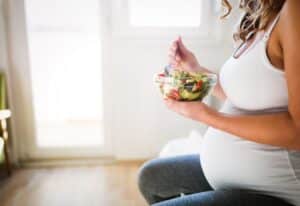Pregnancy Diet: What to Eat for a Healthy Pregnancy

Introduction
Maintaining a healthy diet during pregnancy is crucial for the well-being of both the mother and the baby. Proper nutrition supports the baby’s development and helps manage common pregnancy symptoms. In this blog post, we’ll dive into the essential nutrients you need, the best foods to include, and which ones to avoid for a healthy pregnancy.

Key Nutrients for a Healthy Pregnancy
Folic Acid
Benefits of Folic Acid
Folic acid is a vital nutrient that helps prevent neural tube defects in the developing baby. It also supports the formation of the placenta and the development of the baby’s brain and spine.
Foods Rich in Folic Acid
You can find folic acid in foods like leafy green vegetables, citrus fruits, beans, and fortified cereals. Including a variety of these foods in your diet ensures you get enough of this essential nutrient.
Iron
Importance of Iron
Iron is necessary for making hemoglobin, which carries oxygen in your blood. During pregnancy, your blood volume increases, making iron even more critical to prevent anemia.
Iron-Rich Foods
Good sources of iron include lean meats, poultry, fish, lentils, beans, and iron-fortified cereals. Pairing these foods with vitamin C-rich fruits can enhance iron absorption.
Calcium
Role of Calcium in Pregnancy
Calcium is crucial for the development of your baby’s bones and teeth. It also helps maintain your bone health as the baby grows.
Calcium Sources
Dairy products like milk, cheese, and yogurt are excellent sources of calcium. If you’re lactose intolerant, consider alternatives like fortified plant-based milks or calcium-rich leafy greens.
Omega-3 Fatty Acids
Benefits for Baby’s Development
Omega-3 fatty acids, particularly DHA, are important for the baby’s brain and eye development. They also play a role in reducing the risk of preterm birth.
Foods Containing Omega-3
Incorporate foods like fatty fish (such as salmon and sardines), chia seeds, flaxseeds, and walnuts into your diet to get a good dose of omega-3s.
Protein
Why Protein is Essential
Protein supports the growth of fetal tissue, including the brain, and increases your blood supply. It’s vital for the overall development of your baby.
High-Protein Foods
Lean meats, poultry, fish, eggs, dairy products, beans, and nuts are all excellent sources of protein. Make sure to include a variety of these in your meals.
Foods to Include in Your Pregnancy Diet
Fruits and Vegetables
Best Choices
Fruits and vegetables are packed with essential vitamins, minerals, and fiber. Opt for a colorful variety to ensure you get a broad spectrum of nutrients.
How to Incorporate Them
Add fruits to your breakfast cereal or yogurt, include salads with your meals, and snack on raw vegetables with hummus for a nutrient-rich diet.
Whole Grains
Benefits of Whole Grains
Whole grains provide important nutrients such as fiber, iron, and B vitamins. They help maintain your energy levels and support the baby’s growth.
Examples of Whole Grains
Include foods like oatmeal, brown rice, quinoa, whole-wheat bread, and whole-grain pasta in your diet for a healthy boost.
Lean Proteins
Options for Lean Proteins
Choose lean meats like chicken and turkey, fish, eggs, and plant-based proteins such as beans and tofu. These provide high-quality protein without excess fat.
Cooking Tips
Grill, bake, or steam your proteins instead of frying to keep your meals healthy and lower in unhealthy fats.
Dairy Products
Importance of Dairy
Dairy products are rich in calcium and vitamin D, which are crucial for bone health. They also provide protein and other essential nutrients.
Lactose-Free Options
If you’re lactose intolerant, opt for lactose-free dairy products or fortified plant-based alternatives like almond milk, soy milk, or coconut milk.
Foods to Avoid During Pregnancy
Raw and Undercooked Foods
Risks Involved
Consuming raw or undercooked foods can expose you to harmful bacteria and parasites, which can cause foodborne illnesses and affect your pregnancy.
Safe Alternatives
Ensure all meats are thoroughly cooked, avoid raw seafood like sushi, and steer clear of unpasteurized dairy products.
High-Mercury Fish
List of High-Mercury Fish
Fish like shark, swordfish, king mackerel, and tilefish have high mercury levels that can harm your baby’s developing nervous system.
Safe Fish Choices
Opt for low-mercury fish such as salmon, trout, and sardines. Limit tuna intake and consult guidelines on safe fish consumption during pregnancy.
Caffeine
Effects of Caffeine
High caffeine intake is linked to an increased risk of miscarriage and low birth weight. It can also affect your sleep and hydration levels.
Safe Consumption Levels
Limit your caffeine intake to about 200 milligrams per day, roughly the amount in one 12-ounce cup of coffee. Consider decaffeinated options or herbal teas.
Alcohol
Why Alcohol is Harmful
Alcohol consumption during pregnancy can lead to fetal alcohol syndrome and other developmental issues. It’s best to avoid alcohol entirely.
Alternative Beverages
Choose non-alcoholic beverages like sparkling water with a splash of fruit juice, herbal teas, or mocktails to stay refreshed and safe.
Meal Planning Tips for Pregnant Women
Balanced Diet Guidelines
Creating a Meal Plan
Plan meals that include a balance of fruits, vegetables, whole grains, lean proteins, and dairy. Aim for a variety of foods to cover all nutritional bases.
Sample Meal Plan
A sample meal plan might include oatmeal with berries for breakfast, a quinoa salad with vegetables and grilled chicken for lunch, and baked salmon with sweet potatoes and green beans for dinner.
Hydration
Importance of Staying Hydrated
Hydration is crucial during pregnancy to support increased blood volume, amniotic fluid, and overall health. Dehydration can lead to complications.
Best Hydration Practices
Aim to drink at least eight 8-ounce glasses of water daily. Include water-rich foods like fruits and vegetables, and avoid sugary drinks.
Snacking Smart
Healthy Snack Ideas
Choose snacks that provide nutrition and energy, such as nuts, seeds, yogurt, fruit, and whole-grain crackers with cheese or hummus.
Snacks to Avoid
Avoid snacks high in sugar, salt, and unhealthy fats, such as candy, chips, and baked goods. These offer little nutritional value and can lead to excessive weight gain.
Managing Common Pregnancy Symptoms Through Diet
Morning Sickness
Foods to Eat
Ginger tea, crackers, and small, frequent meals can help alleviate nausea. Opt for bland, easy-to-digest foods.
Foods to Avoid
Avoid spicy, greasy, or strong-smelling foods that can trigger nausea and make morning sickness worse.
Heartburn
Dietary Adjustments
Eat smaller, more frequent meals, and avoid lying down immediately after eating. Avoid spicy, acidic, and fatty foods.
Safe Remedies
Consider drinking a glass of milk or eating a small serving of yogurt to soothe heartburn. Consult your healthcare provider before taking any medications.
Constipation
High-Fiber Foods
Incorporate high-fiber foods like whole grains, fruits, vegetables, and legumes into your diet to help prevent constipation.
Hydration Tips
Staying well-hydrated and regular physical activity can also aid in relieving constipation.
Conclusion
Eating a balanced, nutrient-rich diet during pregnancy is one of the best ways to support your baby’s development and your own health. By focusing on key nutrients, including a variety of healthy foods, and avoiding certain risks, you can navigate your pregnancy with confidence and well-being. Remember, every pregnancy is unique, so consult with your healthcare provider to tailor your diet to your specific needs.
FAQs
Can I continue my vegetarian/vegan diet during pregnancy? Yes, you can maintain a vegetarian or vegan diet during pregnancy as long as you ensure you’re getting all the essential nutrients. Focus on protein, iron, calcium, vitamin B12, and omega-3 fatty acids. You may need to take supplements to meet your nutritional needs.
How much weight should I gain during pregnancy? Weight gain during pregnancy varies based on your pre-pregnancy weight. Generally, if you were at a healthy weight before pregnancy, a gain of 25-35 pounds is recommended. Your healthcare provider can give you personalized advice.
Are prenatal vitamins necessary if I eat a balanced diet? Even with a balanced diet, prenatal vitamins are recommended to ensure you get enough essential nutrients like folic acid, iron, and DHA. They act as a safety net to fill any nutritional gaps.
What should I do if I have food aversions? If you experience food aversions, try to find alternative sources for essential nutrients. For example, if you can’t tolerate meat, opt for plant-based proteins like beans and lentils. Discuss with your healthcare provider to find solutions.
Can I eat spicy foods while pregnant? Yes, you can eat spicy foods if they don’t cause discomfort or digestive issues like heartburn. Listen to your body and adjust your diet accordingly. If you experience adverse symptoms, it’s best to limit spicy foods.

